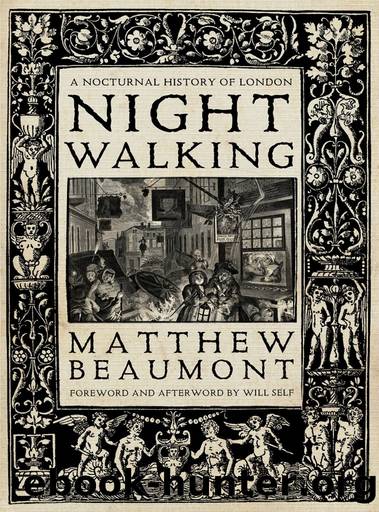Nightwalking: A Nocturnal History of London by Matthew Beaumont

Author:Matthew Beaumont [Beaumont, Matthew]
Language: eng
Format: azw3
Tags: Non-Fiction, Travel, History
ISBN: 9781784783785
Publisher: Verso
Published: 2015-03-24T00:00:00+00:00
Apology for Vagrants
The late eighteenth and early nineteenth centuries were a period in which, because of the systematic displacement of people through enclosures, and as a result of the rapid entrenchment of industrial capitalism, the numbers of unemployed wage-labourers multiplied visibly. Pre-industrial artisans and skilled workers were to an increasing extent recruited or press-ganged into the ranks of the itinerant proletariat â forced into a nomadic existence by the need simply to subsist. Economic migrants, especially from Ireland and Scotland, were familiar figures on rural roads. In England, border counties like Cumberland became especially susceptible to the problem of pauperism, because âthe less liberal poor laws and settlement regulations of Scotland encouraged a persistent movement of destitute persons across the borderâ.37
From the mid 1790s in particular, female vagrants, left with little or no means of subsistence after their husbands had been sent to fight against France on the continent, were an especially striking feature of the social landscape. Several of Wordsworthâs poems from this period, in testifying to this parlous situation, developed something like a poetics of vagrancy. In âAn Evening Walkâ, for example, Wordsworth depicts a female vagrant who, as the neglected wife of a soldier, is one of the forgotten victims of war. As she drags her children along the road in the gathering darkness, the poet demonstrates that he is acutely conscious of her physical pain. He imagines the âarrowy fireâ that shoots âstinging through her stark oâer-laboured bonesâ as she hopelessly attempts âTo teach their limbs along the burning road / A few short steps to totter with their loadâ.38
The influence of John Langhorneâs The Country Justice (1774â1777), which Wordsworth praised as the first poem âthat fairly brought the Muse into the Company of common lifeâ, can be felt here. In his âApology for Vagrantsâ, Langhorne had invoked a âhouseless Wretchâ, a soldier who is slain and who leaves behind him a wretched widow and her innocent child.39 But Langhorneâs allusion to societyâs victims lacks immediacy. In Wordsworthâs poem, by contrast, the sense of the female vagrantâs acute physical pain as she inches forward on foot â communicated through language that is itself, admittedly, a little âoâer-labouredâ â derives its considerable force from the poetâs concrete observations and experiences on the roadside.
More importantly, in âThe Female Vagrantâ, first published in the Lyrical Ballads (1798), Wordsworth instead tried to narrate the life story of one of these victims of war, poverty and the depredations of class society in her own voice. Hence, the eponymous character recapitulates for the poet a devastating series of events. She relates that a rapacious landlord, determined to rid the landscape surrounding his mansion of its labourersâ cottages, dispossessed her pious father; that, after her fatherâs death, âthe empty loom, cold hearth, and silent wheelâ pushed her and her children into deeper and deeper poverty; that her husband joined the army and, as a consequence, âdog-like, wading at the heels of warâ, she was forced to emigrate with him, to âprotract a curst
Download
This site does not store any files on its server. We only index and link to content provided by other sites. Please contact the content providers to delete copyright contents if any and email us, we'll remove relevant links or contents immediately.
The Power of Myth by Joseph Campbell & Bill Moyers(673)
Four Shakespearean Period Pieces by Margreta de Grazia(638)
A Social History of the Media by Peter Burke & Peter Burke(637)
Inseparable by Emma Donoghue(603)
The Complete Correspondence 1928-1940 by Theodor W. Adorno & Walter Benjamin(505)
Bodies from the Library 3 by Tony Medawar(487)
Culture by Terry Eagleton(459)
The Spike by Mark Humphries;(459)
A Theory of Narrative Drawing by Simon Grennan(455)
World Philology by(450)
Farnsworth's Classical English Rhetoric by Ward Farnsworth(441)
Ideology by Eagleton Terry;(435)
A Reader’s Companion to J. D. Salinger’s The Catcher in the Rye by Peter Beidler(427)
Adam Smith by Jonathan Conlin(419)
Comic Genius: Portraits of Funny People by(408)
Monkey King by Wu Cheng'en(401)
High Albania by M. Edith Durham(394)
Game of Thrones and Philosophy by William Irwin(390)
Early Departures by Justin A. Reynolds(381)
